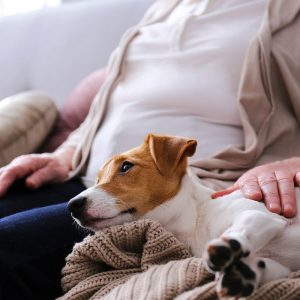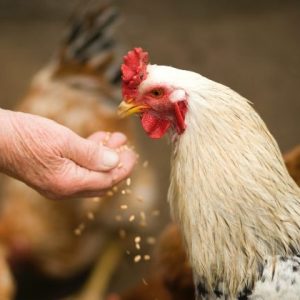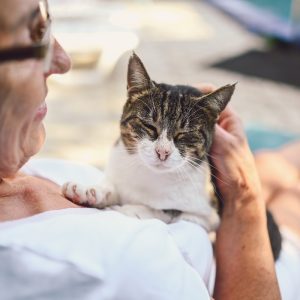A new study has shown how the presence of animals in care homes can impact the health and wellbeing of some care home residents. Researchers found evidence that, for many residents, interacting with animals was positive, offering an opportunity to maintain a sense of self.
The study, carried out by our Evidence Synthesis Team, found that residents had meaningful relationships with animals and derived pleasure, comfort and companionship from them. They also found that animals brought an interesting dimension to the daily life and routines of care homes and looking forward to visits brought pleasure to residents. “I love it. I look forward to it”, commented one resident.
Bringing together the evidence
The systematic review, a way of bringing together all the available evidence on a given research topic, examined the evidence from 34 studies, and is the first to synthesise both qualitative and quantitative evidence on human-animal interactions in a residential care setting. The studies reported on a wide range of human-animal interactions – resident home pets and animals kept on site such as chickens, personal pets of residents, and animal-assisted interventions such as dog therapy or small animal visits like kittens and rabbits. Some of the studies were about residents’ experiences of interacting with the animals, while other studies measured the effects of animals on loneliness, depression, and anxiety.
Lead author, Research Fellow Dr Noreen Orr, said: “The qualitative evidence showed that residents interacted differently with animals. For example, animals helped some to reminisce and share stories of previous pets, but for others, there were sad memories of pets who had died or had to be rehomed on moving into care. While stroking and cuddling animals could be soothing, particularly for those living with dementia, the research showed that they could experience confusion with memories of past pets, uncertain about what was real and true. So, it’s important that care homes facilitate interacting with animals as part of a person-centred care approach, thinking about how they can best match individuals’ needs and respecting resident choice and autonomy, as animals are not for everyone.”
The quantitative evidence was based on 18 randomised controlled trials which measured the effects of animals on a range of outcomes including loneliness, depression, anxiety, agitation and quality of life. There was some evidence that animals can help reduce anxiety, depression and loneliness but overall, there was limited evidence of measured improvements in wellbeing.
Co-author, Senior Research Fellow Dr Rebecca Abbott, explained that “these discrepancies across the qualitative and quantitative evidence may be because the outcome measures used in the trials may not reflect what are important to care home residents. They also may be a reflection of the small number of residents participating in the trials which means that the sample sizes were too small to detect meaningful differences.”
Questions for future research
The team identified a widespread societal acceptance of the benefits of animals for residents in residential and nursing care, a factor which could exert a subtle pressure on researchers to report positive findings. This, combined with a lack of information in the studies they reviewed about the potential for negative responses from residents has lead the team to suggest that establishing an understanding of the challenges of introducing animals into residential care settings could be a potential focus for future research in the area.
Communicating creatively
The team have produced a variety of resources and creative means of dissemination for their findings. As well as their systematic review, published in BMC Geriatrics, the team have developed a board game, called Pet Purrsuits, to help care home staff learn about the challenges and positives of having pets in care homes and a Pet-themed newspaper style article called The Daily Mews to creatively communication their findings.
Read the team’s blog on the process of developing Pet Purrsuits.
Related publications

How do robopets impact the health and wellbeing of residents in care homes? A systematic review of qualitative and quantitative evidence.
Read the publication



